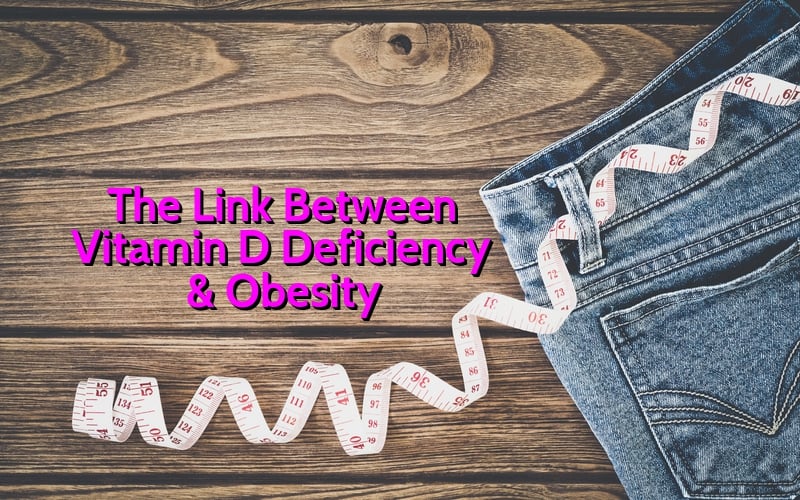Why Vitamin D Deficiency is a Common Cause of Obesity

When it comes to losing weight, there are so many recommendations: Move more (walk, run, do HIIT/interval training, lift weights). Eat less (eliminate gluten, reduce sugar, cut carbs, go low fat, try intermittent fasting). Start eating breakfast or stop eating breakfast. Drink more water or tea or coffee. Add lemon or apple cider vinegar to your water. Eat more protein, vegetables, and/or fiber. Some of this advice is, well, better than others. Yet, one surprising reason for the current obesity epidemic is nutrient deficiencies. Shocking that we could be deficient in anything in the world of abundance and convenience most of us live in. However, there’s one well-established association, and that’s the link between Vitamin D and obesity.1
Why Vitamin D is Important?
Often called the “sunshine vitamin,” vitamin D is a fat-soluble vitamin that serves as a hormone in the body.2 Not only is vitamin D key for strong, healthy bones, almost every other tissue in the body has vitamin D receptors, and it’s vital to the health and function of the pancreas, immune system, skin, thyroid, colon, etc.
Yet, vitamin D deficiency and insufficiency occur often both in the US and around the globe with an estimated 1 billion people having inadequate levels.3 This isn’t good as there’s a laundry list of health concerns associated with inadequate levels of vitamin D, including weight gain, poor immune function, decreased muscle strength, poor metabolic function, mood-related issues, poor heart health, cognitive decline, getting sick more often, declining bone health, and more— including increased risk of death from all causes. And certain populations are at a greater risk of deficiency, including older adults, dark-skinned individuals, and those who have limited sun exposure. 4
The Link Between Vitamin D and Obesity
A number of studies have found a link between suboptimal levels of vitamin D and an increased risk of obesity as well as an increased risk for complications related to obesity.1 Other research indicates the vitamin D bioavailability has been decreased in people who are obese as the vitamin is locked into body fat compartments.5 In other words, some scientists believe body fat can “sequester” vitamin D (which is fat soluble); meanwhile, other researchers believe vitamin D needs may be body size-dependent. One study discovered that when subjects lost at least 15% of their body weight, their vitamin D levels increased nearly three times compared to those who lost between 5 and 10% of body weight.6
Yet, it wasn’t until a study published in 2015 that researchers discovered increasing vitamin D levels may also help promote weight loss by helping improve the metabolic rate in both overweight and obese subjects who have low levels of vitamin D. In this study, 400 overweight and obese people followed a moderately-reduced-calorie, balanced diet and then received either no vitamin D supplement, 25,000 IU vitamin D per month, or 100,000 IU vitamin D per month.7 The researchers measured body mass index, waist circumference, body composition, vitamin D levels, and fasting glucose and insulin levels at the start of the study and then again six months later.
While both groups receiving vitamin D supplements saw increased serum levels of vitamin D, only the group that had received 100,000 IU had attained optimal vitamin D status. Yet, both groups also achieved greater weight loss and more substantial losses in waist circumference than the group that received no supplemental vitamin D at all.
The researchers concluded: “The present data indicate that in obese and overweight people with vitamin D deficiency, vitamin D supplementa¬tion aids weight loss and enhances the beneficial ef¬fects of a reduced-calorie diet.”
Another 12-week study found that in healthy overweight and obese women, increasing levels of vitamin D did not improve weight loss; however, more importantly, women supplementing with vitamin D did lost over 5 TIMES more body fat.8 Finally, the largest study with 4,600 elderly women showed that those who had the highest levels of vitamin D experienced less weight gain over the 4 ½-year study.9
Vitamin D and Obesity
One meta-analysis found that vitamin D deficiency was 35% higher in obese folks and 24% higher in people who are overweight. In addition to the link between vitamin D and obesity, the researchers also discovered that folks with lower levels of vitamin D are also likely to have larger waistlines and higher amounts of belly fat, especially in women.10 In men, the lower vitamin D levels were associated with fat in the liver as well as the belly. It has not yet been determined, however, whether the lower vitamin D levels caused the belly fat or if the increased belly fat levels led to the lower vitamin D levels.
How Does Vitamin D Affect Weight?
Researchers are continuing to look into the connection between vitamin D and obesity to see if they can provide a more elaborate explanation. At this time, researchers don’t know for sure. However, some common theories include that vitamin D may help:
- Reduce the formation of new fat cells
- Suppress fat cell storage
- Boost metabolism to burn more calories
- Increase levels of serotonin
- Increase levels of testosterone
- Increase appetite control and satiety
How Much Is Enough Vitamin D?
The Daily Reference Intake (DRI) for vitamin D is 600 IU per day for adults. Yet, a more accurate assessment of vitamin D status comes from blood levels of 25-hydroxyvitamin D, 25(OH)D. To prevent a deficiency, according to the Institute of Medicine (IOM), 25(OH)D levels should be above 20. Yet, others indicate higher levels. For example, the Endocrine Society has concluded that, “Based on all the evidence, at a minimum, we recommend vitamin D levels of 30 ng/mL, and… to guarantee sufficiency, we recommend between 40 and 60 ng/mL for both children and adults.”11 This indicates there is some controversy regarding how much you may need as levels that are too high are concerning as well.
The best way to combat the vitamin d and obesity link is via sunlight exposure (with bare skin exposed), which accounts for upwards of 90% of the vitamin D circulating in your body. Spending just 15 minutes 2 to 3 times per week (between the hours of 11:00 am and 3:00 pm from May through October with 40% of the skin exposed) appears to be adequate. However, skin pigmentation does affect how much (UVB) you absorb, which ultimately is converted to the active form of vitamin D in the body. Those with lighter skins may need less sun exposure while those with darker skin may need more. If it’s difficult to get that much due to weather, lack of sunshine, and/or geographical location, food sources include oily fish, egg yolks, and mushrooms, and dairy products are also often fortified with vitamin D.
Of course, supplements are also available. Experts recommend supplementing with at least 2,000 IU per day, and more may be needed to get into the optimal range of 40 – 60 ng/mL 25(OH)D. That’s right, you can forget the measly 200 – 800 IU/day recommendations, which have been shown to be inadequate to achieve healthy levels. Folks who are overweight or obese may need to supplement with 2 – 3 times more vitamin D to get into a healthy range.
The Link Between Vitamin D and Obesity: A Recap
Vitamin D has long been known for its bone strength benefits, and research also indicates it helps protect the heart, support healthy blood sugar and immunity, and even prevent hair loss. Now we see there is also a clear connection between vitamin D and obesity. So, ensuring you have enough vitamin D is important to not only to support optimal health but also healthy weight.






